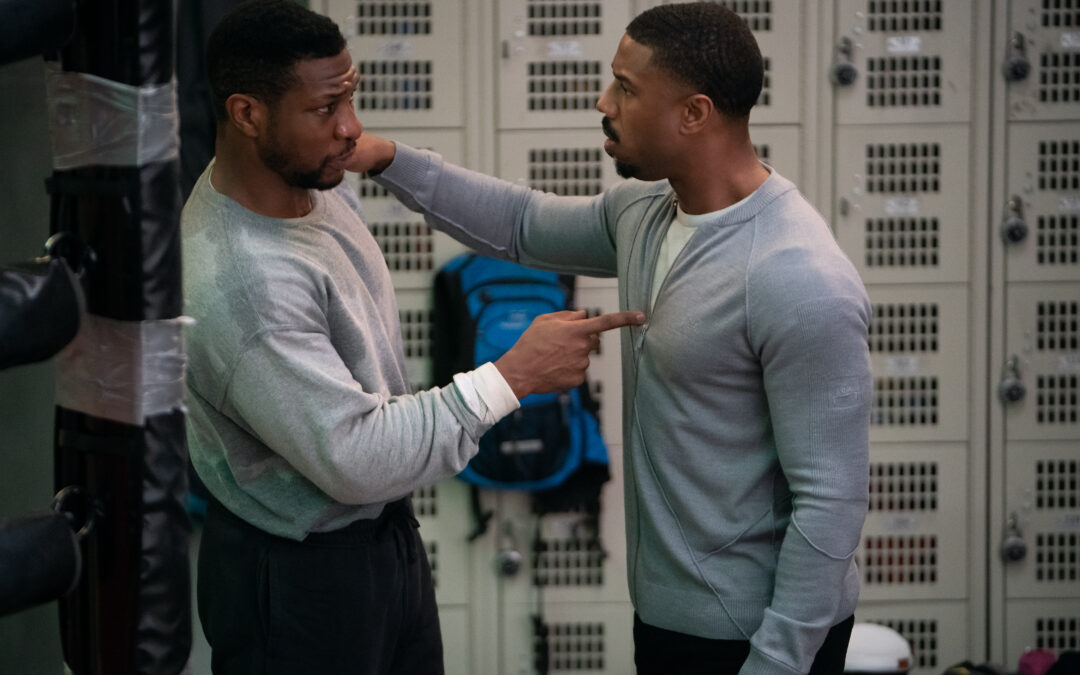
Creed III: Exclusive Interview with Michael B. Jordan x Jonathan Majors
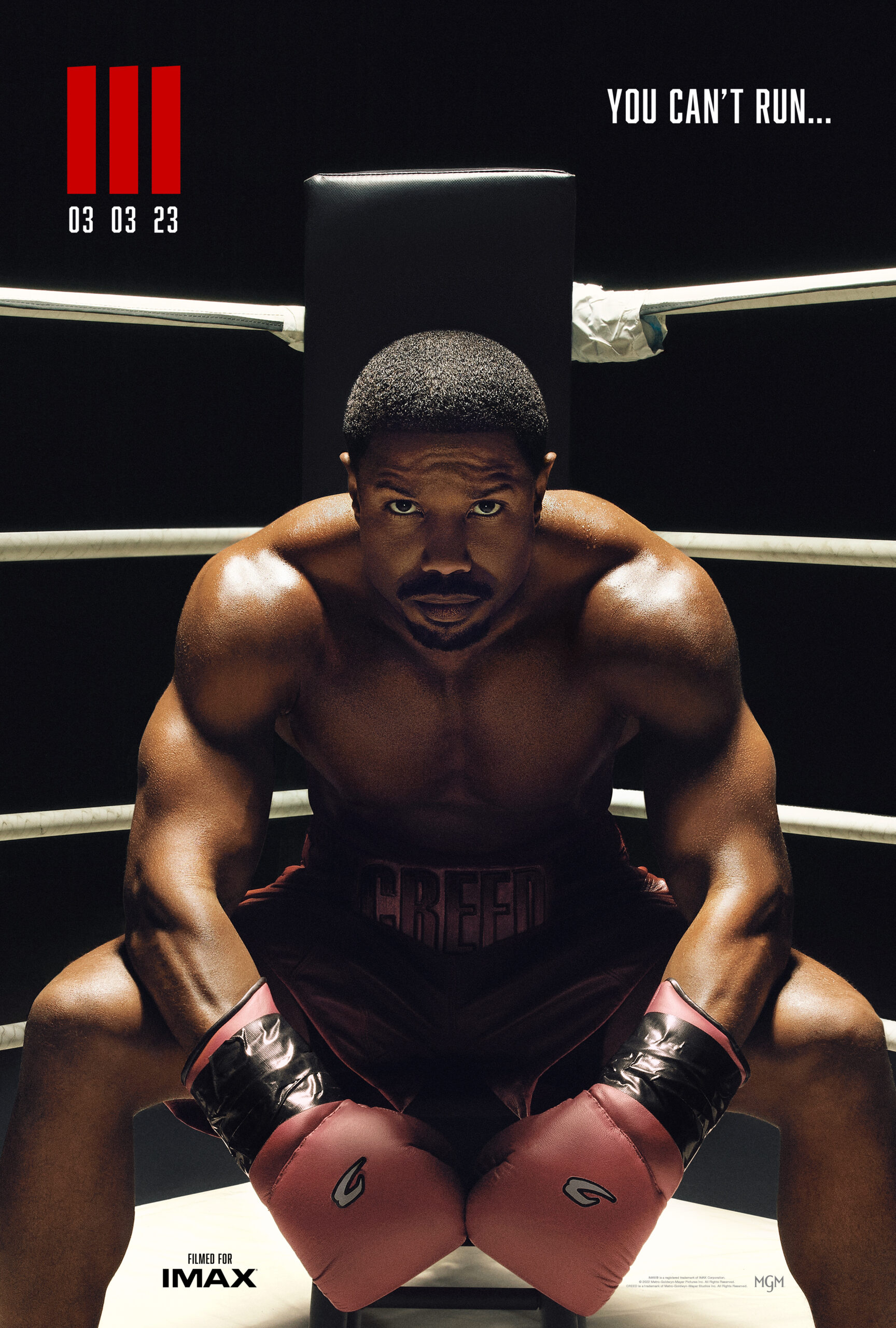
Creed III
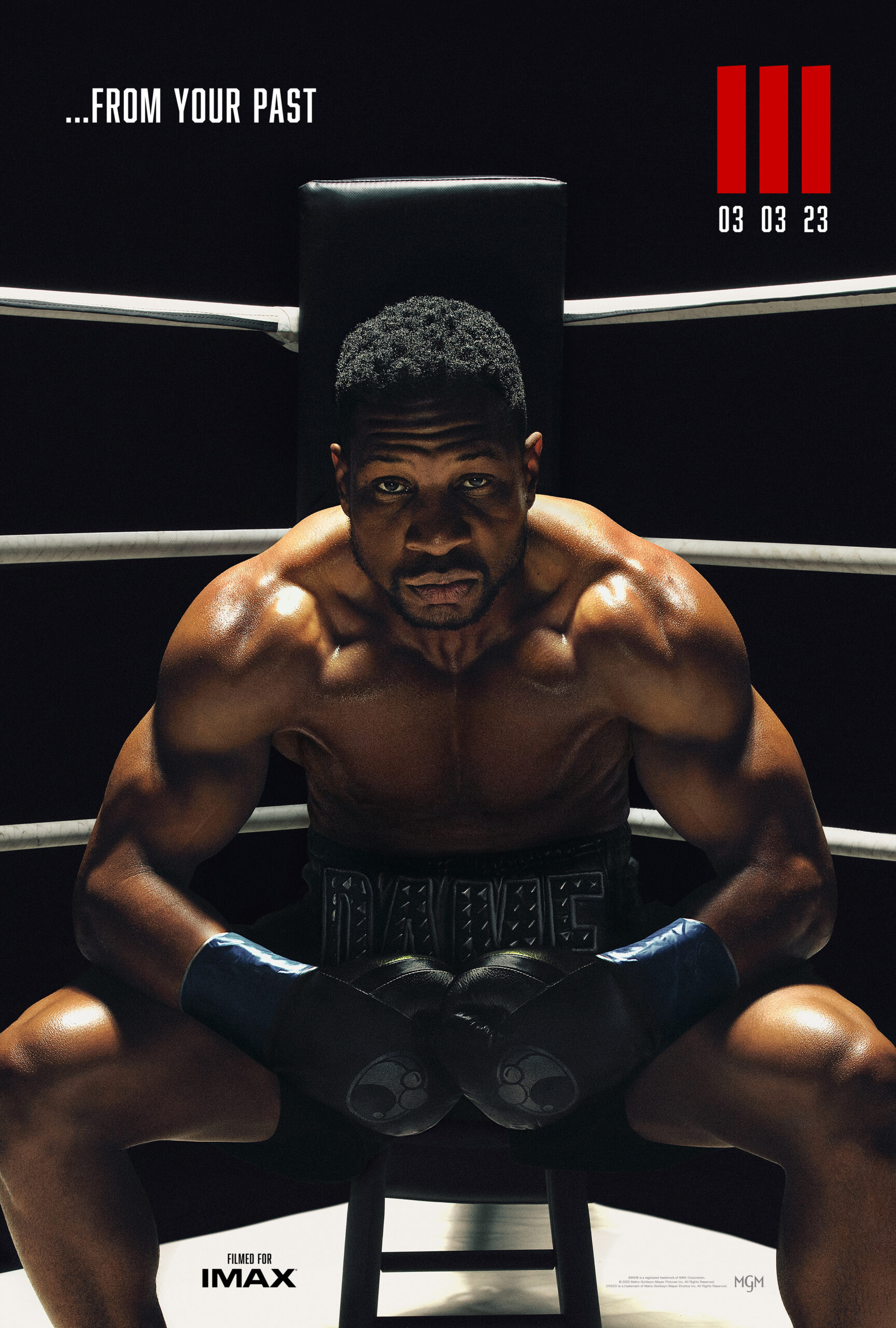
The following is an edited excerpt for clarity, the full audio interview is above.
Allen
I’m Allen Reynolds, the editor of UrbanFaith. I had the opportunity to interview Michael B. Jordan and Jonathan Majors about their new movie Creed III, in theaters everywhere, March 3.
One of the things I thought Creed III did so well was to give space and allow for complexity in emotion and aspiration for black people, but especially for black men. Why was it important for you guys to show joy, loss, sorrow, pride, and you were able to capture so much of that. Why was that important?
Michael B. Jordan
I think because the narrative has often been one note for a long time. Through cinema on a project like this that’s going to get so many eyes, so many different points of view, to show those layers and complexities that is us. That is black men, men in general, but specifically our stories. We wanted to give it the respect and the honesty because we all know a Damian, we all know an Adonis, at some point at some level. And being able to represent those stories in a truthful way was really important to see.
Allen
Another thing that stuck out to me as well was that you have all these different relationships, you have mentor mentee, friendships, black marriage, fatherhood, being a child with an aging parent, and of course rivalry, all of that is so much a part of our story. What was it like to inhabit all those different roles?
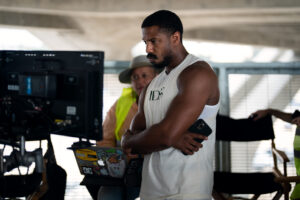
Director Michael B. Jordan on the set of his film
CREED III
A Metro Goldwyn Mayer Pictures film
Photo credit: Ser Baffo
© 2023 Metro-Goldwyn-Mayer Pictures Inc. All Rights Reserved
CREED is a trademark of Metro-Goldwyn-Mayer Studios Inc. All Rights Reserved.
Michael B. Jordan
Felt freeing. Honestly, for me, as a filmmaker, now a real storyteller, in a real way, being able to talk about and show the things that I’ve experienced that affect me in my life. Other people [and myself] have those type of relationships. Also, I think it felt it felt great to do work, I felt completely honest, real, and grounded. We do projects, different movies for different reasons. And all of it may not feel personal, [but] you try to bring a little bit of yourself to these roles. Feels good. It felt good.
Jonathan Majors
I think my mission was a lot different. It’s really a commentary on brotherhood. What [does brotherhood] look like to you? At one point, [Creed] is my best friend, my homeboy, my ally. One point he’s my nemesis. One point, he’s my motivation. The man to that one relationship. We’re gonna continue the relationship between them and beyond as the primary attachment. My mission and my objective was to show the complexity of that relationship. In this one partnership, there’s all these different facets. It’s not just best friend. Sometimes a student- teacher, sometimes it’s beggar-rich man, sometimes it’s prisoner and freemen. There is a slave [and] master within the brotherhood. [Damien] was a coyote, [Creed] was purebred puppy. We were both dogs. Both men were both gladiators were both fighters, but there are these differences. It was difficult to establish those relationships.
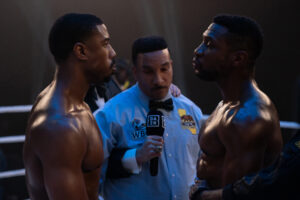
Michael B. Jordan stars as Adonis Creed and Jonathan Majors as Damian Anderson in CREED III
A Metro Goldwyn Mayer Pictures film
Photo credit: Eli Ade
© 2023 Metro-Goldwyn-Mayer Pictures Inc.
CREED is a trademark of Metro-Goldwyn-Mayer Studios Inc. All Rights Reserved.
Allen
I think that you guys left so much room, just to see a movie like this with a majority black cast. Black director, I think you’re carrying on legacy of Oscar Micheaux, Spike Lee, of these black directors, right. And you carrying on for these black actors, the Sidney Poitier, Denzel Washington, Phylicia Rashad was in this movie. I mean, it’s incredible. What is it like for you all to be carrying on the legacy of black art and black film from actors’ and directors’ perspective now?
Michael B. Jordan
It feels good. It feels like we’re honoring their path and the race that they’ve been running. It’s our responsibility as filmmakers in the platform that we have and opportunities that we’re given because of their hard work to continue that work, that study, those ideas. Without Sydney, Denzel, and Harry Belafonte and in all the work that they’ve been doing, and have done, we couldn’t have been given this opportunity to run the way we are. We’re just trying to get every drop of juice out of the lemon, say as much as we can, be truthful and honest. And working with Phylicia, is fantastic. Amazing. Yes, ma’am. Anything you want ma’am. (laughs) Just honoring that it’s surreal sometimes, honestly, for me, it kind of it feels larger than life. You know, I have not really been a guy to stop and like smell flowers often. I’m like, what’s next? But when I hear somebody say that and break it down that way, it just kind of hits me like, wow, okay!
Jonathan Majors
For me, it’s all the aforementioned artists Mike named but also Ella Fitzgerald, and Muhammad Ali, and Sam Cooke [whose legacies] we accepted. I know Mike is about to get on that Walk of Fame.
What we are talking about, it means something because he is going to transcend whatever an actor is, and transcend whatever are director is, you’re a part of popular culture. And that may be a bad word, but popular culture is the culture. When you begin to move at that level, you begin to do what Mike has done and is doing, you join the pantheon of these legends. Not only do we feel motivated to continue it, but to grow it. I mean, respectfully, we know things that Denzel, Sydney, and Harry were learning, we grew up knowing those things. It is our job to push it forward. You know, I think what is happening now is there’s a clear establishment of the new Vanguard. And that’s us. Whether or not we want it, it’s us, and [we have a responsibility.] We have athletes joined us in the fray, but it’s about moving the entire culture forward. You know a huge part of pop culture is black culture. The more we mature, the more sophisticated we become, the more intelligent conversations, the more in-depth conversations become, the more complex they becomes, the more we are adding to our culture and the richness of our culture, but also moving everything forward.
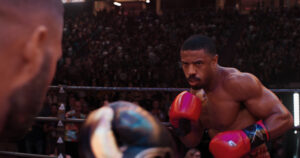
Michael B. Jordan stars as Adonis Creed in
CREED III
A Metro Goldwyn Mayer Pictures film
Photo credit: Courtesy of Metro-Goldwyn-Mayer Pictures Inc.
© 2023 Metro-Goldwyn-Mayer Pictures Inc. All Rights Reserved.
CREED is a trademark of Metro-Goldwyn-Mayer Studios Inc. All Rights Reserved.
Allen
Just pulling back a little bit. You all have both just succeeded so much are two of the greatest black actors in this moment, some of the greatest actors of our generation, if I may say so. And I know that a huge part of that has been growth, and my audience is interested in faith. I know that’s been huge, especially in Jonathan’s journey. Can you talk a little bit about what faith has meant to you all as artists, and even as you continue to climb these ladders and open new pathways?
Michael B. Jordan
Faith, you know, for me is strong. I think we’re in an industry where, you got to have a lot [of faith]. You’re one of many, [who will face] a lot of no’s, a lot of rejection, a lot of obstacles that are in your way, in order for you to see a vision of what success looks like to you. You got to have faith in yourself, you have faith in something bigger than you. I think meditation, spirituality, for me, silence [are impactful]. And then that brings those thoughts that are [helpful] that comes to you. I think it’s extremely important. And also faith in evolving things. I think there’s a way in this industry… a lot of roadblocks that can get in your way and that represent life. As you travel life has a lot of different roadblocks that would come in your way and being the main character of your own movie, as being the hero of your own story, got to have that faith in order to kind of achieve it, reach the mountaintop, so to speak. So that’s something that sticks with me. We have strong faith.
Jonathan Majors
To me [faith] means everything. I know it’s a scary word [in some circles] but I pray all the time. You know this tiny, small little voice, that’s [what has] always guided me. And the building of faith, you know, stepping out on faith. I mean, this whole thing set me off. I hadn’t read the script. This idea of discernment. Michael, and I spoke about that [discernment], that’s what was happening in those 30 minutes [when I was offered the role of Damien]. There’s a Hollywood version where I go, “oh, nice” and I just knew. But I was told. [Or I wouldn’t have done it]. I’ve met Michael’s mother, you know. These are praying, folks. We’ve all been prayed [over] our entire lives and the building of the faith, even having this conversation with you right now. Being asked about [faith], it’s probably a good time, as we both are both tired. I’m not gonna preach. But I have no doubt where my strength comes from.
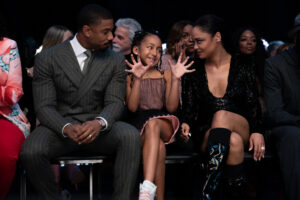
(l-r.) Michael B. Jordan stars as Adonis Creed, Mila Kent as Amara and Tessa Thompson as Bianca in
CREED III
A Metro Goldwyn Mayer Pictures film
Photo credit: Eli Ade
© 2023 Metro-Goldwyn-Mayer Pictures Inc. All Rights Reserved
CREED is a trademark of Metro-Goldwyn-Mayer Studios Inc. All Rights Reserved.
Allen
I appreciate that. Last question for you all. Our audience is young people, young adults, I work with high school actors. What advice would you give to those young folks, young artists who are trying to be successful trying to find their voice. What advice would you give to the next generation?
Michael B. Jordan
Be relentless. I always say be relentless. Find something you care about, that you obsess over, and just go for it. There’s going to be a lot of noise, a lot of resistance. But try not to be distracted by a lot of distractions. [They’re] all around you in a lot of different forms, by way of that little box right there [your phone]. We’re all guilty in a certain way, shape or form sometimes. But I think for young people who grew up with that as the norm [it’s even worse]. I grew up with dial up modems, printing out directions on mapquest lol. That’s, that’s my generation. But a lot of these kids, [smart phones] that’s their truth, that’s their norm. There’s a lot of distraction nowadays. So just being able to put that thing down for a minute and be to your own thoughts, you know what I’m saying, focus, and have the work ethic and not think everything’s so instant and immediate.

Michael B. Jordan and Jonathan Majors at Boys & Girls Club of Atlanta for Creed III Atlanta Outreach
Because a lot of things they feel like, it’s right now, right now, and it’s not, you know what I’m saying? These are products of years of work, dedication and discipline. And I think, I would always preach it to the next generation, to these young kids, to just find that work ethic, because there’s something true to it. There’s something that nobody can take away from hard work. You put the time in and you can’t they can’t take that away from you. Whether that’s reading, whether it’s mastering the craft, doing your 10,000 hours. That is legit.
Jonathan Majors
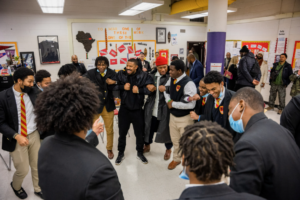
Micahel B. Jordan and Jonathan Majors spend time with students at Urban Prep for Creed III Chicago Outreach
I’m in it now. I would pray for purpose. I would pray for anointing. And once you know what your anointing is, that’s it. A lot of times, we’re just going after the wrong thing. The work ethic, a lot of people think me and Mike just have a dog work ethic. That’s not, not true. But I think something that me and Mike also have in common is that we know what we’re supposed to be doing. We gain a great deal of pleasure from it. It’s our anointing. You hear Michael B. Jordan, it’s not just Michael B. Jordan, something was put in him. Something was put in me, so I have to be aligned with that. When we begin to walk our path, there’s still no’s, there’s still impossibilities… but there’s God. So it’s all good. It’s all good. That’s what I was saying. Then yeah, all the grit and all that…yeah, absolutely. But a lot of times you’re actually just going after the wrong thing. I will say to the young folks, you don’t need your phone yet. Grown ups need phones. We actually have businesses. I don’t use [social media and] stuff like that. But I do understand my colleagues who do. They’re like, in the game, in the matrix, there’s no getting out of it. But for young people, you can keep it so simple. And it can always be simple, unless you complicate it. Suddenly you begin to work through that thing. Then you got to work for it. If you can, if you can abstain for as long as you can. It’ll let you know when you need it. Insta-chat-facebook-tweet. Pay attention a little longer. They won’t last. [Social media we grew up on didn’t last].
View the final movie trailer below

 I have a confession to make. You might want to sit down for this: I am a young Black woman and I enjoyed the film
I have a confession to make. You might want to sit down for this: I am a young Black woman and I enjoyed the film